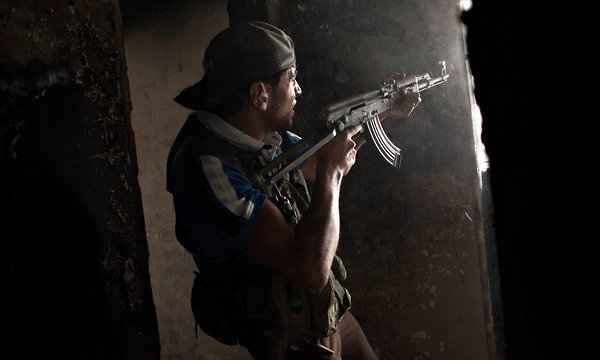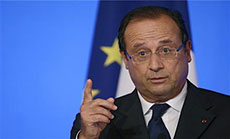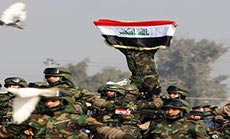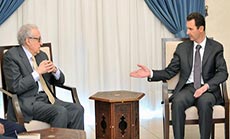
NYT: "Future" Supplier of Saudi Money To Rebels, US Gulf Allies Fear Terrorism Funding

"A serpent is to kill its creator".
Saudi Arabia and Qatar fear that arming the Syrian rebels means funding terrorism.

According to the American "New York Times" daily, the two gulf monarchies "have been funneling money and arms to Syria's rebels, but have refused to provide heavier weapons."
"While they have publicly called for arming the rebels, they have held back," officials in both countries said. This, in part is because they have been discouraged by the United States, which fears the heavier weapons could end up in the hands of terrorists.
"You can give the rebels AKs, but you can't stop the Syrian regime's military with AKs," said Khalid al-Attiyah, a state minister for foreign affairs in Qatar. Providing the rebels with heavier weapons "has to happen," he added. "But first we need the backing of the United States, and preferably the UN."
Saudi officials uncovered that Washington "was not barring them from providing shoulder-fired missiles, but warning about the risks."
Many Saudi and Qatari officials now fear that the fighting in Syria is awakening deep sectarian animosities and, barring such intervention, could turn into an uncontrollable so-called "popular jihad" with consequences far more threatening to Arab governments than the Afghan war of the 1980s.
In parallel, the newspaper highlighted "there are signs of an uptick in the number of young men crossing illegally into Syria from Saudi Arabia and other Muslim countries, and of private fund-raising efforts across the gulf to help the rebels acquire heavier weapons."
"Already, regional Islamist funding networks are being built up," said Abdelaziz al-Gasim, a prominent lawyer in Riyadh Gasim.
"These are private channels with people in Kuwait and Qatar, and you cannot control them - there are deep business relationships in the gulf," he said.
However the paper shed light that "the Saudi and Qatari governments have themselves to blame, because the major pan-Arab satellite TV stations they control - al-Arabia and al-Jazeera, respectively - have done more than any other outlets to stoke anger against Syria's government and urge sympathy with the rebels."
"Both stations have been accused of being little more than rebel mouthpieces, and they have played on sectarian fears and hatreds," it added.
The Saudi government is also paying the salaries of many defected Syrian officers, and financing medical assistance to Syrian refugees.
But at the Turkish border town of Antakya late last month, Syrian rebels spoke openly of the Saudi and Qatari intermediaries who dole out weapons on behalf of their governments.
The chief Saudi supplier is said to be a Lebanese figure named Oqab Saqr, who belongs to the political coalition of Saudi Arabia's chief ally in Lebanon, Saad Hariri.
Maysara, 40, a lean rebel commander from the northern town of Saraqib, who withheld his last name for safety reasons unveiled that "they deliver weapons once every few weeks." In one recent shipment, he said, a 200-man fighting brigade received six Russian-made AS Val assault rifles, and thousands of rounds of ammunition.
Maysara added that "Saqr seemed to struggle with supply issues; he once saw Saqr asking rebels for the name and contacts of a weapons dealer from the former Yugoslavia that he was hoping to meet."
"The Saudi government appears to be trying to finance more secular rebel groups," Maysara said, "while the Qataris appear to be closer to the Muslim Brotherhood."
But these distinctions are slippery, in part because rebel groups adapt their identities to gain money and weapons. One group, in an almost comical bid for support, named itself the Rafik Hariri brigade, after the former Lebanese prime minister and Saudi ally, and whose son Saad is influential in doling out Saudi support to the rebels.
Source: NYT, Edited by moqawama.org
Comments

France’s Hollande in Qatar for Warplane Deal
9 years ago
Iraq Police Dismantles Al-Qaeda Protest Site
10 years ago
